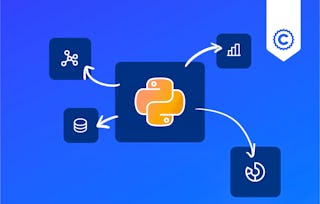Kickstart your Python journey with this beginner-friendly, self-paced course taught by an expert. Python is one of the most popular programming languages, and the demand for individuals with Python skills continues to grow.
This course takes you from zero to programming in Python in a matter of hours—no prior programming experience is necessary! You’ll begin with Python basics, including data types, expressions, variables, and string operations. You will explore essential data structures such as lists, tuples, dictionaries, and sets, learning how to create, access, and manipulate them. Next, you will delve into logic concepts like conditions and branching, learning how to use loops and functions, along with important programming principles like exception handling and object-oriented programming. As you progress, you will gain practical experience reading from and writing to files and working with common file formats. You’ll also use powerful Python libraries like NumPy and Pandas for data manipulation and analysis. The course also covers APIs and web scraping, teaching you how to interact with REST APIs using libraries like requests and extract data from websites using BeautifulSoup. You will practice and apply what you learn through hands-on labs using Jupyter Notebooks. By the end of this course, you’ll feel comfortable creating basic programs, working with data, and automating real-world tasks using Python. This course is suitable for individuals interested in pursuing careers in Data Science, Data Analytics, Software Development, Data Engineering, AI, and DevOps and a variety of other technology-related roles.
















